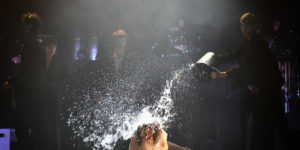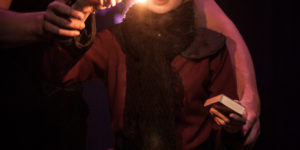Artzóna / ceskatelevize.cz - Barbora Truksová, 17 December 2018
The ballet adaptation of Shakespeare's The Taming of the Shrew was performed by Alena Pešková at the Josef Kajetán Tyl Theatre. Accompanied by the original music of Jan Kučera and a superbly selected cast, she has created quite possibly the best ballet performance by DJKT in recent years.
Alena Pešková, otherwise the artistic director of the Liberec Ballet, set the story in the 1950s. The "Stepford" housewives seem to be an ideal parallel to the position of women in the 16th century. However, a woman in a subordinate position, as the central theme of Shakespeare's comedy can be interpreted, would be an oversimplification of a drama that essentially contains three plays. The first, usually unstaged (and omitted from the Pilsen Ballet) frames the plot Taming as theatre on theatre, which calls the very action of the play into question to some extent. The second play is the story of Lucentia, Bianca and her other suitors: here we find the many disguises, chastity and feminine ideal of the period conventions of romantic comedies. Finally, there is the most famous, the title piece - the quarrelsome cohabitation of Petruchio and Katherine, whose motif of cruel treatment of a disobedient woman can be found in contemporary tavern songs. However, Shakespeare's conception differs markedly from them: although Catherine is seemingly tamed in the end, it is she who has the final word, contrary to contemporary conventions - she calls for obedience in the end, only to violate it herself with her speech.
In a dance adaptation, there may be a legitimate concern about whether the stagers will succeed in capturing the nuances of Shakespeare's play, especially when its charm comes from its sharp verbal flourishes. Choreographer Alena Pešková, however, has absolutely succeeded in this respect.
The music and choreography are reminiscent of the exuberant works of the Jerome Robbins / Leonard Bernstein duo. Feet in flexion, sharp arms, music with strong jazz elements, strong piano, brass section and drums. Kucera's music is a strong part of the production. Although there is strong inspiration from other composers, including Shostakovich alongside Bernstein, and the film music of Nino Rota, it is refreshingly effective in a way that is not often used for ballet in this country. It maintains tension and atmosphere, yet does not overshadow the action on stage.
Let's get into the action. Padua Square, the hustle and bustle of cafes. Lucentio (Justin Rimke), at the sight of the fragile Bianca (Sara Aurora Antikainen's beautiful arm work here), arranges with a servant to disguise himself as a music teacher. The initial appearance of the exasperated Katerina (Jarmila Hrushkociova), tearing off her underwear, adds to the atmosphere. From the beginning, Katerina shows her quarrelsomeness, but also her distaste for convention - while all the women here wear dresses with wide skirts, she wears trousers. The arrival of the boorish Petruchio (Gaëtan Pires), repeating macho moves with sexual overtones, carries similar characteristics. The other men are elegans, he is a raggedy man in a leather curve. Just as Catherine is the opposite of her sister Bianca, he is the opposite of the fragile Lucentia.
Pešková replaced her passionate verbal attacks with dancing passion. And so the first meeting of Kateřina and Petruchio is a tango combining the typical steps of this dance with her own movement vocabulary and pantomimic elements. In the libretto, Pešková did not fundamentally deviate from the drama's subject matter; she merely adapted the individual situations to the aesthetics of the chosen period. It is not a donkey on which Petruchio takes Katherine after the wedding, but an ice-cream cart. In the elements used, the costumes (Aleš Valášek), and the set (Richard Pešek Jr.), the aesthetics of the 1950s are taken up.
The second act begins in Petruchio's apartment, where he lives with his cronies and where Katherine's "taming" begins. However, it is not Petruchio who is the master of the situation; it is Catherine who rules. The magnificent Jarmila Hrushkoci is here seductive, playful, yet free of any vulgarity. The young dancer Gaëtan Pires does not lag behind and together they form a sparkling duo. The rest of the evening could be described in such superlatives. The final scene and the reversal of the roles of obedient-disobedient, good-suffering is a natural climax to the play and a challenge to the first impression created.
Shakespeare's comedy drama might have seemed a certain contradiction for Alena Pešková, who otherwise delves into psychologically complex and not exactly joyful themes. But perhaps that is why she managed to handle this comedy with ease and a complete absence of bad taste or cheap banter. And Jarmila Hrushkociová appears in another role that seems tailor-made for her vivacious character; she is expressive, yet not overacting. The nuances she imbued the character with helped make for one of her best performances. Gaëtan Pires was also in fine form. With The Taming of the Shrew, the ballet company of the Josef Kajetán Tyl Theatre received a very successful title.
The author is an editor Dance news
Josef Kajetán Tyl Theatre, Plzeň - Jan Kučera, Alena Pešková, William Shakespeare: The Taming of the Shrew
Libretto, direction and choreography: Alena Pešková, Music: Jan Kučera, musical staging and conductor: Jan Kučera, Scene: Richard Pesek jr., costumes: Ales Valasek, assistant choreographer:Zuzana Hradilova, assistant director: Miroslav Hradil. They're dancing: Battista Minola - Miroslav Hradil, Kateřina - Jarmila Hruškociová (alternate Mami Hagihara), Bianka - Sara Aurora Antikainen (alternate Carolina Cortesi, Anna Srncová), Petruccio - Gaëtan Pires (alternate Karel Audy, Richard Ševčík), Lucenzio - Justin Rimke (alternate Justin Rimke), Karel Audy - Karel Audy, Richard Ševčík), Lucenzio - Justin Rimke (alternate Justin Rimke), Karel Audy - Karel Audy, Richard Ševčík (alternate Justin Ševčík). Joshua Lee), Gremio - Grzegorz Mołoniewicz (alt. Mátyás Szilveszter Sántha), Hortensio - Michal Lenner (alt. Ondřej Potužník), Tranio - Miroslav Suda (alt. Geronymo Fuhrmann), Widow - Lýdie Švojgerová (alt. Andronika Tarkošová), Priest - Jiří Žalud and others.
Written from the premiere on 17 November 2017 at the Josef Kajetán Tyl Theatre.


Comments are closed.